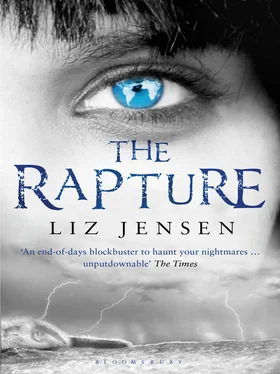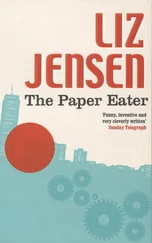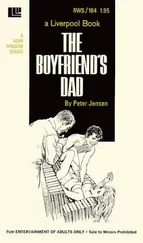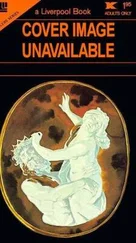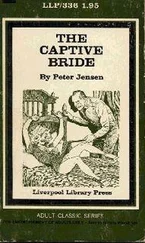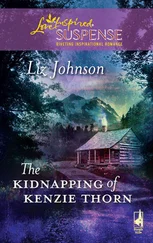‘Meaning?’
‘Meaning are you going to help me escape from here or not?’
I look at the wall again, its splash of triumphant, bloody red. A gust of wind strokes it, detaching a slew of brittle leaves. I don’t reply, just turn and look at her. Her eyes have gone distant and dreamy, as if she is peering at something beyond the horizon or in a parallel place.
‘There’s a thunderstorm coming tomorrow. From the west. I like storms from the west. Hey. Tell you what. I’ll come and watch it from the Creativity Workshop.’ She pauses. ‘You never call it that, do you? Too right-on, yeah?’ I fight a smile. ‘There’s a good view. We could eat popcorn together, Wheels. Cuddle up together and share a Coke like at the movies.’ She pauses and I can feel her grin. ‘You could pretend to be my mum.’
I have stopped at the swimming pool on my way home from work. Six-thirty is a good time, in this heat. Although at over thirty degrees, the water is never truly refreshing, you’ll get a lane to yourself, if you’re lucky. But it seems I’m on a doomed mission. As I’m parking, a blue Renault hybrid pulls up sharply in the disabled space next to me and the woman passenger inside stares at me pleadingly. It’s her. The woman with the lustrous red hair and the pale eyes. There’s a man with her. He’s blond, balding, harassed-looking, and probably what they call time-poor. Older. He looks at me over the steering wheel and gives a helpless, frustrated gesture, as though I should be able to identify and sympathise with his plight. Then, as the woman starts to open the car door, he stops her with a swift movement. And suddenly they’re struggling, locked in a graceless, desperate tussle. I picture the dull, bestial unhappiness of a couple shackled to one another by their mortgage and their children’s shared DNA. I have no doubt that their fight concerns me in some freakish but unfathomable way. Having secured my parking space, I now hesitate. Although I am getting better at it, manoeuvring the wheelchair out of the car is still a hassle. I don’t like the idea of this couple being there, fighting, while I do it. I’ve seen the crazy red-haired woman once too often.
Unwilling to abandon my swim, I decide to drive around the car park in the hope they’ll assume I have gone, and then leave themselves. Pulling out, in my mirror I see the woman turn to yell at the man again. Her features are stamped with misery. Something is severely, irredeemably wrong. It crosses my mind that they could be the parents of an Oxsmith patient: they seem about the right age to have a teenager. Mental illness in a child can exact a terrible price. Whole families implode. But if the woman wants to speak to me, why not ask for a meeting in the normal way? When I get back to my parking space they have left and I can enjoy the pool. But it takes thirty lengths’ worth of hard swimming to eradicate the woman’s stare.
The storm has erupted. The thunder’s on a spin-and-tumble cycle and the sky is mottled with grey and black cloud. When Bethany arrives in the studio — a bulky, Mohican-haired female nurse is already sitting in — we watch the sky froth and churn. The view is operatic, the arms of the white windmills revolving intently in the distance, forked lighting cracking over the ink-pool of the sea, trees straining at the roots, their canopies stirred up like seaweed, sometimes a filament whipping off to become a missile. As the lightning-flashes illuminate the room and plunge it back into shadow, Bethany wanders around turning her head this way and that, as though sensing the air’s pulse. She opens the window and thrusts her face out, inhaling the air through the white bars.
‘I’d like to climb to the top of a mountain. Just stand there and let the lightning hit me. Kapow. Right into the brain. Or dive into the sea when it’s on fire.’
‘I wonder what other kind of thoughts you have, about death,’ I say, because it’s worth a try. But she pays no attention. Today I’m an irrelevance, a petty distraction from her queen-sized thoughts. When she finally stops pacing, she stands in the middle of the room, her face spattered with raindrops, breathing in deep lung-fuls of thunder-air, eyes closed.
‘Here,’ I say, shoving some charcoal at her with an aggression I somehow can’t quite hide. ‘You came here to draw, so draw.’
Surprisingly, she obeys. I watch her at the worktop, her face concentrated, her body bent oddly close to the paper. She works fast, fluidly, intensely, almost tearing at the page. Charcoal dust flies up. Every now and then she wipes the sweat from her face, leaving a dark smear of grime. What she is sketching now — a series of swirls and arabesques — doesn’t correspond to the landscape outside. She covers the paper hastily, letting each sheet fall to the floor when she tires of it. In one, there’s a human shape: a man diving off a cliff.
‘Who’s that?’ I ask, pointing.
‘Ever seen those cliff-divers, on TV? In Acapulco? They spread their arms and they dive off into the sea. Like Christ.’
‘Would you call yourself a believer?’
‘No.’
‘You used to be. The church you belonged to—’
‘His church. Not mine.’ She points to her temples. ‘Look. The mark of the Beast. Doctors do that. They put stuff in and they suck other stuff out.’
‘Tell me what sort of man your father is, Bethany. Even if you have mixed feelings about him, I wonder if there’s something you could describe about him?’ She shakes her head. ‘Or your mother?’
‘Hey. I’ll tell you something. Useful fact about electricity. Lightning isn’t supposed to strike twice in the same place. But some people have been hit by it three times. It’s the metal in their blood. My blood’s full of metal.’
‘Do you feel you attract trouble?’ I ask, rolling a piece of chalk between my fingers. I am getting a visceral urge to draw — or more simply just to make a mark on something as proof of my own existence. But something deep and tribal, something with its own arcane emotional rules and rituals, forbids me. Bethany shakes her head and smiles, then tut-tuts.
‘Therapy questions will get you nowhere. Try asking some real ones.’
‘Give me some suggestions. Let’s do a role-reversal.’
‘Nice try,’ she laughs. ‘But who the fuck would ever want to swap places with a spaz?’
I begin to tidy up the clay-working area. A minute later, the bell rings for lunch and the nurse comes for her and she is gone.
The clouds are massing outside, unfurling in silent grey waves of vapour. Watching them roll and spread, I realise that I need Bethany. When I concentrate on her, exquisitely unpleasant though it sometimes is — I can forget myself. And forgetting can be addictive, I’ve learned that by now. Bethany has no love for the world. If you feel that way, and maybe have cause to, if you believe you died at the age of fourteen, there can be worse things than being here, imagining that you house a ghost — a kind of raging electric Gaia — that empowers you. Bombarded by cataclysmic predictions about the consequences of global warming, and with a childhood forged in the increasingly popular notion of hellfire, why not give way to the delusion that you have special powers? With the temporary memory loss that comes with ECT, you can be born again every week, to voice extravagant threats or, in another mood, to find solace in small enclosed things, your anxieties and dreams in deep storage. I know about that, I’ve lived it: the hopes quietly shelved or violently thrown aside, the sustaining beliefs about humanity’s importance in the universe rendered absurd, meaningless.
The sky is almost black now. It could be night. The clay corner is a disaster area, so it is only half an hour later, when my next session is due to start, that I roll over to where Bethany has been working, and see, next to the charcoal skyscapes and the skydiver, the crude red crayon drawing she has left on the worktop. It could have been done by an eight-year-old. It’s a stick-figure, lying askew. Female, to judge from the triangular breasts and the triangular skirt.
Читать дальше
